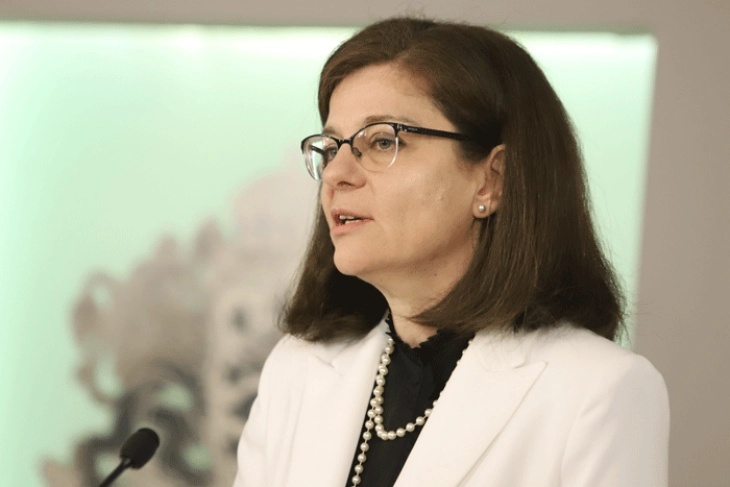Bulgarian foreign minister announces resignation
- Post By Magdalena Reed
- 13:03, 9 June, 2022

Sofia, 9 June 2022 (MIA) — Bulgarian Foreign Minister Teodora Genchovska announced she would resign Thursday, after learning that Prime Minister Kiril Petkov had been holding talks with European diplomats to lift the Bulgarian veto on North Macedonia’s start of EU talks. Genchovska told BTV she would submit her resignation to Parliament later in the day, according to MIA’s Sofia correspondent.
This is why, the Bulgarian foreign minister said, she was unable to say if she would attend the upcoming meeting with German Prime Minister Olaf Scholz, who is visiting Skopje and Sofia on Saturday.
Genchovska said there were recent meetings between Prime Minister Kiril Petkov with European diplomats on the topic of North Macedonia that she did not attend. She also noted there were classified transcripts of the meetings.
Asked whether she had seen any transcripts in which Petkov was seeking to circumvent the veto, she said she had “received information from EU representatives that there were other signals.”
“The Ministry of Foreign Affairs is a perfect institution. There are transcripts of each meeting. They are classified according to their content and can be shown if necessary,” Genchovska said, adding that foreign policy should not depend on political parties.
In response to a question whether Sofia was under pressure to lift the veto, Genchovska said the pressure was stronger in January and February but Bulgaria had stated its position at the time and the European partners were now “showing understanding.”
Previously, Toshko Jordanov from There Is Such People said the Bulgarian Prime Minister was seeking ways to circumvent Bulgaria's ruling coalition agreement on North Macedonia. Jordanov alleged that talks with European diplomats had taken place over the past three to four months.
“Put yourself in the diplomats’ shoes,” Jordanov said. “Talking to Minister Teodora Genchovska, they hear one thing, and talking to the prime minister’s representatives, or even him personally, they hear something else.
“Ways to circumvent the coalition agreement were being sought so the Republic of North Macedonia could start the EU accession process without any guarantees for fulfilling the Treaty signed between the two countries,” he added.
The Bulgarian Parliament has 240 lawmakers, 67 of whom are from Petkov's We Continue the Change party and 16 are from Democratic Bulgaria. These two parties of the ruling coalition have shown a softer stance regarding the country’s blockade of North Macedonia's European integration.
The Bulgarian Socialist Party and There is Such a People, where Genchovska comes from, are the other two parties in the ruling coalition. They share the position of Bulgarian President Rumen Radev that the veto should not be lifted until North Macedonia meets the conditions set by Bulgaria. The BSP has 26 Members of Parliament, and There has Such a People has 25 MPs.
The opposition Movement for Rights and Freedoms party has 34 lawmakers and a softer stance on North Macedonia. Revival has 13 MPs and is considered pro-Russian, the party’s view being that "Macedonia is the second Bulgarian state on the Balkan Peninsula."
The largest opposition party, former Prime Minister Boyko Borissov's GERB, has 59 MPs.
Bulgarian pundits have been commenting on There Is Such a People leader Slavi Trifonov’s statement Wednesday that he would withdraw his ministers from the ruling coalition.
Sociologist Genoveva Petrova of Alpha Research told Sofia-based 24 Chasa daily that Trifonov's move had been expected, remarking that his party was one of the main elements of instability in Bulgaria's ruling coalition.
According to MIA’s Sofia correspondent, Petrova suggested that Bulgaria's minority government would form a new parliamentary configuration. This, she said, would transfer current issues to the Bulgarian Parliament and difficult talks, ultimatums and political "traps" would follow. Petrova also said forming a minority government would be a temporary solution.
Trend research center’s political scientist Dimitar Ganev predicted three possibilities for Bulgaria’s political developments in the near future.
First, he said, 11 MPs would have to be replaced with new ones or a parliamentary group would need to be partly dissolved. The second option was to form a new government within the existing Bulgarian Parliament with another prime minister and support from the three parties which the Bulgarian Constitution gave the right to receive a mandate to participate in parliamentary formation. The third option, according to Ganev, was to hold a snap parliamentary election in September, in which, according to pollsters, GERB would be the strongest political force, but he claimed it was too early to say what the government would propose. mr/







